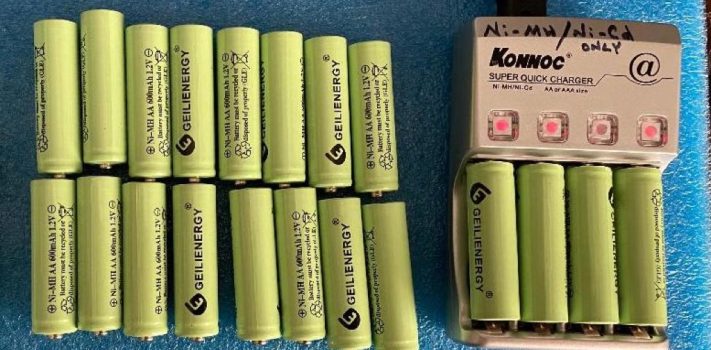Several years ago, I began purchasing Lithium Batteries in AA and AAA sizes for long-term storage in case of some event where batteries were not readily available. I was also using them in several trail cams around the property because they would last roughly 10-to-12 months before replacement. I recently went to buy another couple of 48-packs and found the price had significantly increased. The cellular cameras I use offer a rechargeable lithium pack and comparing to lithium AA I found I could pay for the rechargeable pack in less then two sets of AA lithium batteries. Unfortunately, you cannot safely charge AA or AAA lithium batteries as they are designed as single-use items.
Since I also kept a supply of Lithium batteries on hand for household uses (radios, flashlights, range finders) I began looking at other options for batteries. Several years ago my wife had bought me a set of Eneloop batteries and charger in a case.
They are Ni-MH ‘Low Self Discharge’ and claim to be good for up to 2100 recharges. They provide a nice storage case , charger, several AA and AAA batteries with adapters for C and D size that hold a AA battery inside. They have been great and we use them at the cabin but I wanted to replenish my Lithium supply and found them the Eneloop batteries a little pricey as well. The other issue I had with the Eneloop charger is it was only 120 volt powered and I wanted something I could also charge on 12 volt DC system if need be.
Researching other Ni-MH (Nickel-Metal Hydride) batteries and charges I found another well-rated battery by “Geilenergy” AA, 600 mAh, 1.2 volt. To be fair, the Eneloop claims to hold up to 2000 mAh and I did not do any battery tests to compare the two brands. There is probably some truth in you get what you pay for here but I was not looking for high-performance batteries for my flashlights and AM FM radios. Possibly at a later date I will run a capacity test on the Eneloop and Geilenergy and compare values. I also noted that my charger is only rated for 1000 mAh so I will have to include the chargers in the test as well.
My Ni-MH charger has the option of running on standard 120 (100-240) volt household power or 12 volt DC for charging. I’ve had this charger a few years and a quick search I could no longer find a reseller for the unit. A search on Amazon did reveal several manufacturers of chargers with dual AC and DC voltage inputs.
I store my charged batteries in a small plastic container and label the lid the last recharge date, usually about once a year.
Important Safety Note: I do not store 9-volt batteries loose in the container unless they have a band of electric tape over the terminals to prevent them from shorting and potentially starting a fire.
There are some fancy battery organizers available with included testers for those who desire more organization. Hopefully, this brief article will give others some thoughts and ideas on keeping extra batteries on hand for safekeeping at minimal cost.










